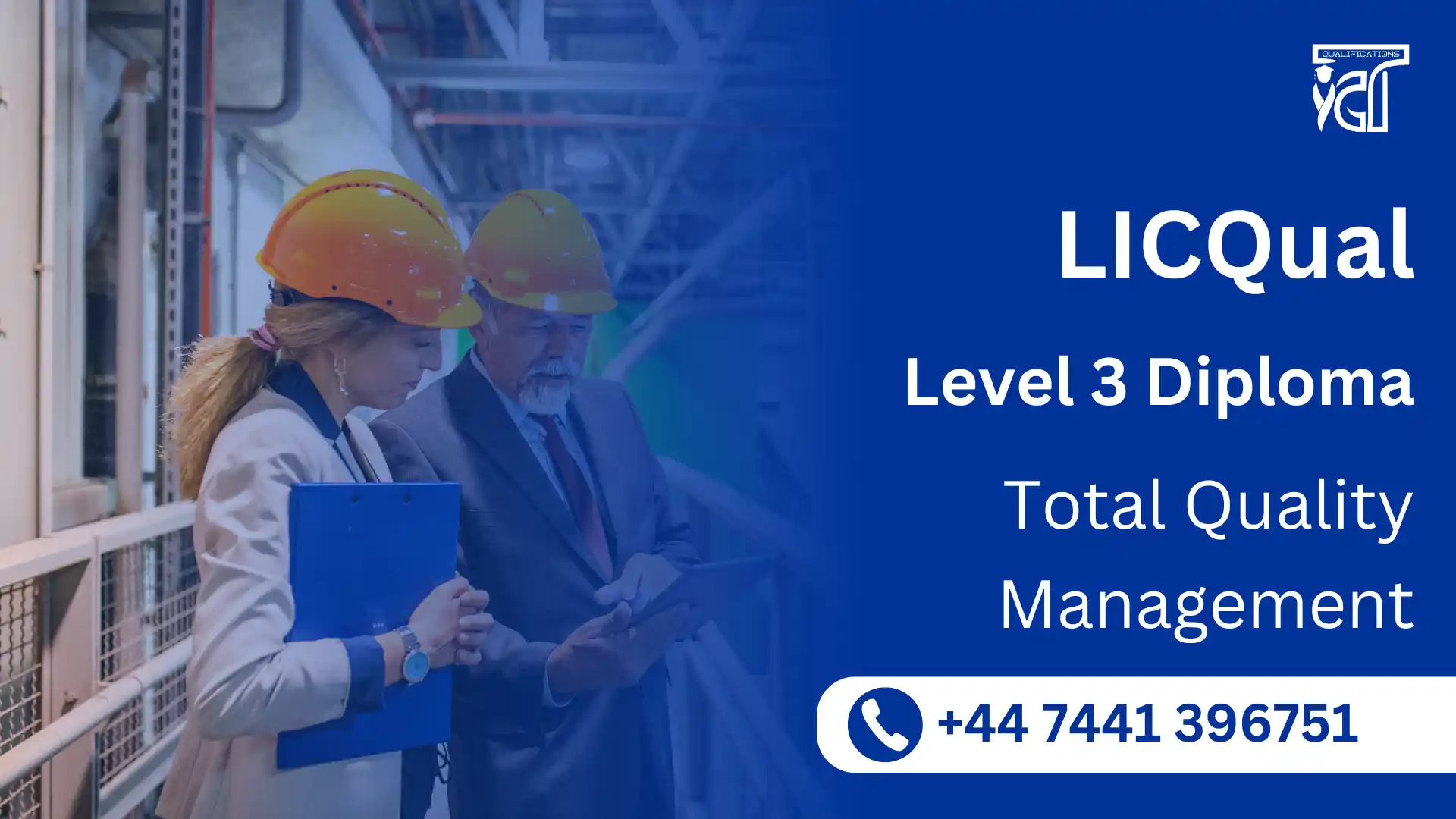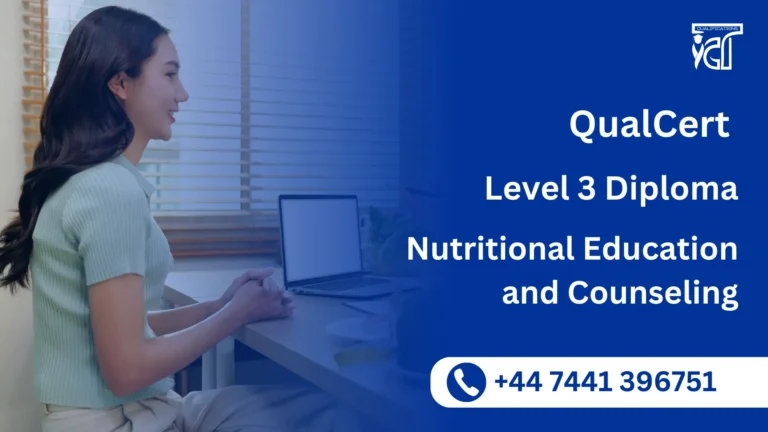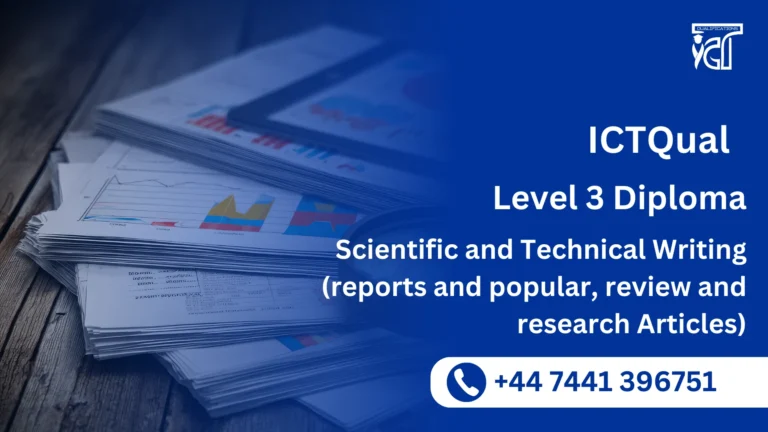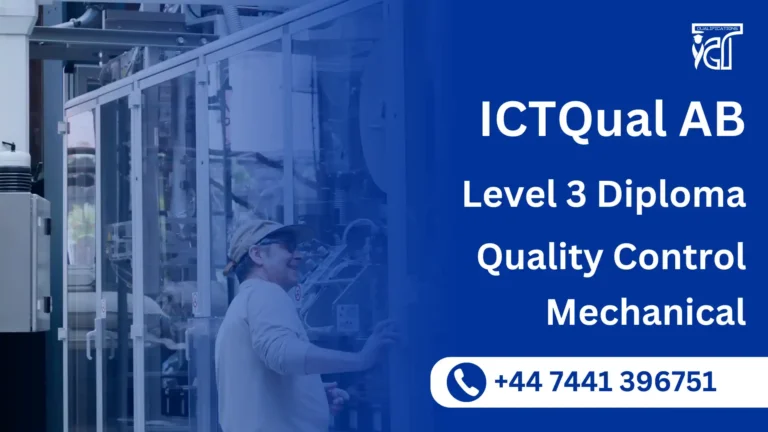The LICQual Level 3 Diploma in Total Quality Management (TQM) is a comprehensive, assignment-based qualification designed to equip learners with the essential knowledge and practical skills needed to implement and maintain quality management systems within organizations. This diploma introduces learners to the fundamental principles of TQM, focusing on continuous improvement, customer satisfaction, and effective process management.
This qualification is ideal for individuals seeking to begin or advance their careers in quality management, operations, or compliance. It provides a strong foundation in understanding how quality standards and practices contribute to organizational success. Learners will explore topics such as quality planning, process improvement, problem-solving techniques, and quality assurance methods. By mastering these skills, they will be able to support organizations in achieving efficiency, consistency, and excellence in products and services.
The LICQual Level 3 Diploma in Total Quality Management emphasizes practical application, ensuring that learners can apply quality management tools and techniques in real workplace scenarios. Through structured assignments, participants gain confidence in managing quality processes, conducting audits, and contributing to a culture of continuous improvement.
Internationally recognized, this diploma enhances employability across industries such as manufacturing, construction, healthcare, logistics, and services, where quality management is critical. It also provides a progression pathway to higher-level qualifications in quality assurance, management, and leadership, opening doors to further professional growth.
Whether you are starting a career in quality management or looking to strengthen your current role, the LICQual Level 3 Diploma in Total Quality Management offers the skills, knowledge, and credibility to help you succeed in today’s competitive business environment.
LICQual Level 3 Diploma in Total Quality Management
The Study Units of LICQual Level 3 Diploma in Total Quality Management are as :
| Unit Ref# | Unit Title | G-L-H | GLH |
| LICQ2200023-1 | Introduction to Total Quality Management | 10 | 40 |
| LICQ2200023-2 | Quality Planning and Control | 10 | 40 |
| LICQ2200023-3 | Quality Assurance and Auditing | 10 | 40 |
| LICQ2200023-4 | Continuous Improvement Techniques | 10 | 40 |
| LICQ2200023-5 | Quality Management Tools and Techniques | 10 | 40 |
| LICQ2200023-6 | Managing Quality Across Functions | 10 | 40 |
GLH (Guided Learning Hours) and TQT (Total Qualification Time) are terms commonly used in vocational qualifications to help define the amount of time a learner is expected to spend on their studies.
1. GLH (Guided Learning Hours)
GLH refers to the number of hours a learner spends being directly taught, supervised, or supported during their course. This includes the time spent in activities such as:
- Classroom instruction
- Practical workshops
- One-on-one tutoring or mentoring sessions
- Online learning sessions with tutor support
In other words, GLH represents the time that learners are actively engaged with their instructors or learning activities.
2. TQT (Total Qualification Time)
TQT represents the total amount of time a learner is expected to invest in completing a qualification, including:
- GLH (Guided Learning Hours): Time spent on direct learning, as explained above.
- Self-Directed Learning: This includes time spent on independent study, research, assignment completion, preparation for exams, and any other work the learner does outside of direct teaching hours.
TQT is a broader measure that includes all the time required to achieve the qualification. It helps learners and employers understand the overall commitment required for the qualification.
Key Differences Between GLH and TQT:
- GLH focuses on direct learning with guidance or supervision.
- TQT includes GLH as well as independent study time and other learning-related activities.
Example:
If a qualification has a TQT of 600 hours and a GLH of 250 hours, it means the learner should spend 250 hours in direct learning (classroom, online, or tutor-led sessions) and 350 hours on independent study or research.
The LICQual Level 3 Diploma in Total Quality Management is designed to give learners a strong foundation in the principles and practices of quality management. Each study unit focuses on key aspects of TQM, enabling learners to understand quality concepts, apply tools, and support organizational excellence. By the end of this course, learners will gain practical knowledge and skills that can be applied across industries to improve efficiency, customer satisfaction, and overall performance.
1. Introduction to Total Quality Management
- Understand the fundamental principles of Total Quality Management.
- Recognize the importance of quality in achieving organizational goals.
- Explore the historical development and modern applications of TQM.
- Appreciate the role of TQM in enhancing customer satisfaction.
2. Quality Planning and Control
- Learn the steps involved in effective quality planning.
- Apply quality control techniques to monitor and improve processes.
- Understand how planning contributes to consistent product and service delivery.
- Develop skills to set measurable quality objectives.
3. Quality Assurance and Auditing
- Understand the principles of quality assurance and its role in compliance.
- Learn the process of planning and conducting internal quality audits.
- Gain skills in identifying non-conformities and recommending corrective actions.
- Support continuous improvement through effective auditing practices.
4. Continuous Improvement Techniques
- Explore the concept of continuous improvement in organizational growth.
- Learn popular improvement methods such as Kaizen and Six Sigma basics.
- Develop problem-solving skills to eliminate inefficiencies.
- Apply continuous improvement practices to enhance workplace performance.
5. Quality Management Tools and Techniques
- Understand and apply key quality management tools such as flowcharts, checklists, and Pareto analysis.
- Use problem-solving tools to identify and resolve quality issues.
- Apply statistical techniques to monitor and improve processes.
- Gain confidence in selecting the right tools for different quality challenges.
6. Managing Quality Across Functions
- Learn how to integrate quality management into all organizational functions.
- Understand the role of employees at all levels in supporting quality.
- Explore cross-functional teamwork for achieving quality objectives.
- Apply strategies to align quality management with business performance.
The LICQual Level 3 Diploma in Total Quality Management is designed to provide learners with the essential skills and knowledge to implement effective quality management practices within any organization. This qualification focuses on practical application, ensuring participants can improve operational efficiency, maintain high standards, and contribute to organizational success. By completing this diploma, learners gain professional credibility and are well-equipped to support continuous improvement initiatives across industries.
1. Develop Core Quality Management Skills
- Gain a solid understanding of Total Quality Management principles and practices.
- Learn to implement quality planning, control, and assurance processes effectively.
2. Enhance Problem-Solving and Continuous Improvement
- Acquire techniques for identifying inefficiencies and improving processes.
- Apply continuous improvement methods to enhance organizational performance.
3. Practical and Assignment-Based Learning
- Benefit from hands-on, assignment-driven learning rather than exams.
- Apply TQM concepts directly to real workplace scenarios for immediate impact.
4. Improve Organizational Efficiency and Performance
- Learn to manage quality across multiple functions and teams.
- Support consistent product and service delivery while boosting customer satisfaction.
5. Strengthen Professional Credibility
- Gain an internationally recognized qualification that enhances career prospects.
- Position yourself as a competent professional in quality management and operational excellence.
6. Career Progression and Industry-Relevant Knowledge
- Open pathways to higher-level quality management or leadership qualifications.
- Equip yourself with skills relevant to industries such as manufacturing, healthcare, logistics, and services.
7. Promote a Culture of Excellence
- Understand the role of quality management in fostering continuous improvement.
- Contribute to building a workplace culture focused on efficiency, consistency, and excellence.
Ideal Learner for the LICQual Level 3 Diploma in Total Quality Management
The LICQual Level 3 Diploma in Total Quality Management (TQM) is designed for professionals who want to develop practical skills and expertise in quality management. This qualification is suitable for individuals seeking to improve operational efficiency, implement quality standards, and contribute to organizational excellence. It is ideal for those looking to start a career in quality management or enhance their current role in maintaining high-quality processes and services.
This program is ideal for:
- Entry-Level Quality Professionals
- Individuals beginning their careers in quality management, operations, or compliance.
- Learners seeking foundational knowledge in Total Quality Management principles and practices.
- Supervisors and Team Leaders
- Professionals responsible for overseeing processes, ensuring quality standards, and supporting teams in achieving operational excellence.
- Operational Staff in Various Industries
- Employees in manufacturing, healthcare, logistics, and services who want to contribute to improving product and service quality.
- Aspiring Quality Auditors and Coordinators
- Individuals aiming to develop skills in quality assurance, auditing, and process improvement.
- Professionals Seeking Career Progression
- Learners who want to build a pathway to higher-level qualifications in quality management, operational leadership, or management roles.
- Individuals Focused on Continuous Improvement
- Those committed to fostering a culture of excellence, efficiency, and customer satisfaction within their organization.
Entry Requirements
Register Now
Qualification Process
LICQual Level 3 Diploma in Total Quality Management
- Self-Assessment:
Begin by evaluating your eligibility to ensure you meet the qualification requirements, including work experience, knowledge, and language proficiency. - Registration:
Complete your registration by submitting the required documents, including a scanned copy of a valid ID, and paying the registration fee. - Induction:
An assessor will conduct an induction to confirm your eligibility for the course and explain the evidence requirements. If you do not meet the criteria, your registration will be canceled, and the fee will be refunded. - Assignmnets & Evidence Submission:
Provide all assignmnets and the necessary evidence based on the assessment criteria outlined in the course. If you are unsure of the required evidence, consult with the assessor for guidance on the type and nature of evidence needed. - Feedback and Revision:
The assessor will review your submitted evidence and provide feedback. Evidence that meets the criteria will be marked as “Criteria Met,” while any gaps will be identified. You will be asked to revise and resubmit if needed. - Competence Evidence:
Submit final evidence demonstrating that all learning outcomes have been met. This evidence will be marked as “Criteria Met” by the assessor once it is satisfactory. - Internal Quality Assurance (IQA):
The Internal Quality Assurance Verifier (IQA) will review your evidence to ensure consistency, quality, and compliance with standards. - External Verification:
The IQA will submit your portfolio to LICQual External Quality Assurance Verifiers (EQA) for final confirmation. The EQA may contact you directly to verify the authenticity of your evidence. - Certification:
Upon successful completion of all checks, LICQual will issue your official certificate, confirming that you have attained the
LICQual Level 3 Diploma in Total Quality Management






